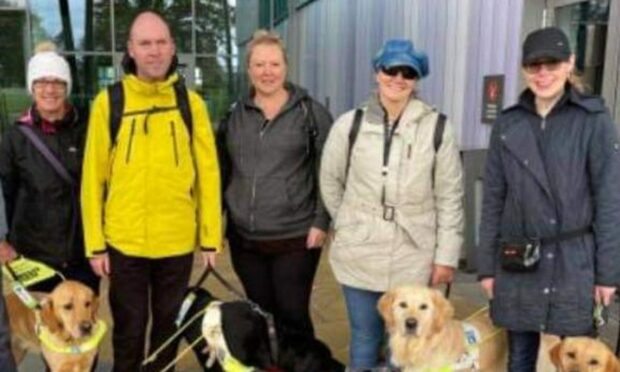An Inverness woman has warned others about sudden sight loss, after diabetes complications left her blind in one eye.
Angela Clelland, 47, has lived with type 1 diabetes for over three decades – but faced a “devastating” diagnosis in December 2020.
The positive behavioural support practitioner suddenly lost her vision, leaving her “scared and frustrated” about what might happen next.
She was told she had diabetic retinopathy, where issues with her blood sugar levels had damaged the blood vessels in the backs of her eyes, causing them to leak.
And at some points she was unable to see anything at all.
‘Scary’ diagnosis sapped her confidence
Angela found the diagnosis “very, very scary” – made even worse as Covid restrictions were keeping her from support.
She said: “I was isolated in the pandemic and that affects everything from making a cup of tea, or putting a glass down on the table – you spill it because you miss the table.
“[I lost] the confidence to go out, and wasn’t able to check my diabetes because I couldn’t read the monitor.
“I did take to my bed because there was no point getting up when all you do is walk into cupboards and things.
“The whole impact, it’s devastating.”
‘Nothing more they can do’
Since her diabetic retinopathy diagnosis, Angela’s had six operations on her eyes but was recently told the vision in her left will never come back.
“There’s nothing more they can do, I’ve not quite processed that yet,” she admitted.
“The changes that have happened over the last year and a half have been quite aggressive,” she said.
But she does still have vision in her right eye and has the support of friends as she rebuilds her confidence.
Angela’s also met up with an eye care liaison officer from the RNIB who “went out of her way” to help.
“I have vision in my right eye, so I can still work from home,” she said.
“I’m still going, I just need to gain more confidence.
“I’ve had a lot of support, I’ve got a really good friends network, so they’ve helped me through it.”
‘Take your eye health seriously’
Angela admits the threat of sight loss wasn’t something she was strongly aware of when she was diagnosed with diabetes.
“They do tell you there’s a possibility of stroke, heart attack, amputation or sight loss, but no one ever tells you that [sight loss] will happen.
“When I was diagnosed it was discussed but people need to know there’s a high probability – there wasn’t enough knowledge in my days.”
She’s urging anyone in a similar boat to seek medical assistance, as the outcome of her condition could have been different if it was caught sooner.
The main symptoms of diabetic retinopathy include sight loss, “floaters” in vision and eye pain.
“You need to take your eye health seriously. You need to make sure that you are going for your eye health checks. Even with the slightest change, go to your optician,” Angela added.
“As things were delayed due to Covid, I would urge anybody who is maybe late or due an appointment to go and make one.
“The effect on your life if you don’t go and something happens is devastating.”
Read more:
Insomnia could increase people’s risk of type 2 diabetes – study


Conversation